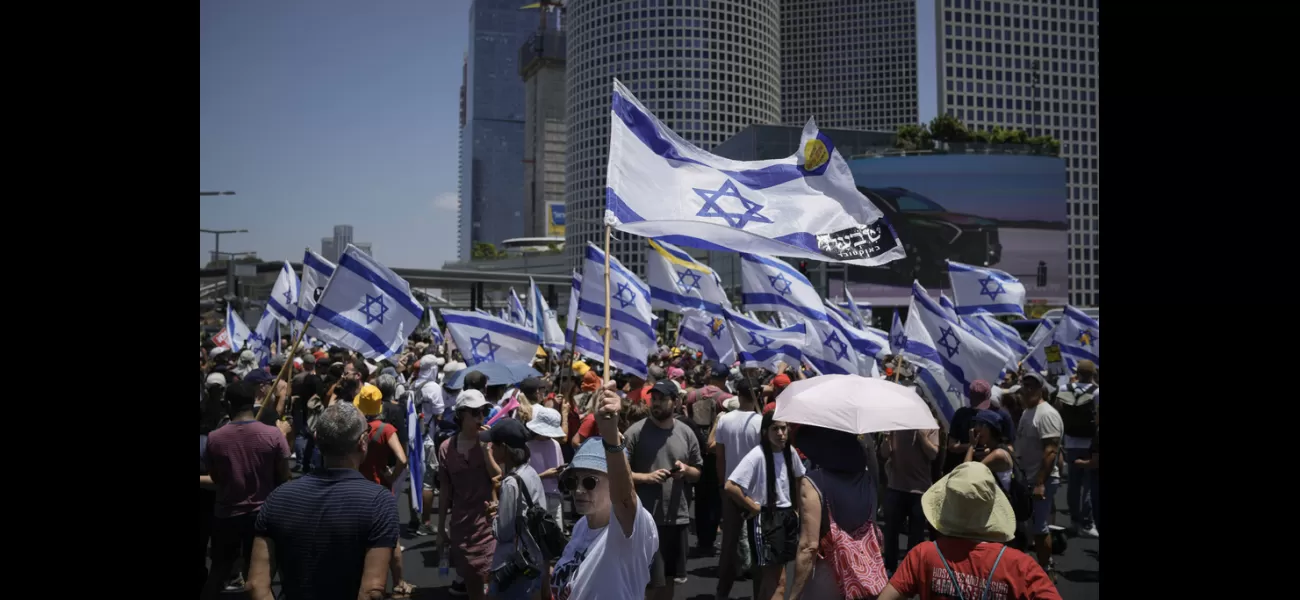Israeli people block roads, demand end to violence and safe return of hostages.
Protests on Sunday followed progress in ceasefire talks as Hamas abandoned demand for Israeli commitment to end war.
July 7th 2024.

Nine months have passed since the start of the war in Gaza, and the frustration and anger of Israeli citizens has reached its peak. In a powerful display of protest, citizens have taken to the streets, blocking major highways and demanding that Prime Minister Benjamin Netanyahu step down. Their main goal is to bring an end to the ongoing conflict and secure the release of the many hostages being held by Hamas.
The demonstrations on Sunday were a result of recent efforts to broker a truce between the two sides. Hamas has agreed to drop their demand for an Israeli commitment to end the war, but they are still pushing for a permanent ceasefire. On the other hand, Netanyahu has vowed to continue fighting until Hamas is completely destroyed.
The initial trigger for this war was the cross-border attack launched by Hamas on October 7. The attack resulted in the death of 1200 people and the abduction of 250 others. In retaliation, Israel launched a massive offensive that has claimed the lives of over 38,000 Palestinians, according to the Health Ministry. It is important to note that this number includes both combatants and civilians.
Sunday was declared as the "Day of Disruption" by the Israeli protesters, and it began at 6:29 am - the exact time when the first rockets were launched by Hamas in their initial attack. The protesters took to the streets, blocking main roads and staging demonstrations outside the homes of government ministers. In a symbolic gesture, 1500 black and yellow balloons were released near the border with Gaza, representing the fellow citizens who were killed or abducted.
One of the protesters, Hannah Golan, voiced her disappointment with the government's handling of the situation. She expressed her frustration at the lack of accountability and responsibility from the leaders. Despite the release of over 100 hostages as part of a November ceasefire deal, there are still 120 hostages in captivity. As the war continues, there are fears that this number will only increase.
The United States has been leading the efforts to broker a phased ceasefire agreement between Israel and Hamas. The proposal includes the release of remaining hostages in exchange for a lasting ceasefire and the withdrawal of Israeli forces from Gaza. However, there are still some roadblocks as Hamas wants guarantees from mediators that the war will end, while Israel wants the freedom to resume fighting if the talks do not progress.
Netanyahu has made it clear that Israel is committed to destroying Hamas' military and governing capabilities. He has also stated that the war will resume after a pause to release the hostages. Despite months of heavy bombing and ground operations, pockets of Palestinian militants are still being battled across Gaza. This has resulted in the devastation of major cities and the displacement of millions of people.
In the midst of this ongoing conflict, reports of brutality and human rights violations continue to surface. The bodies of three Palestinians were found with their hands tied near the Kerem Shalom crossing with Israel. Family members claim that they were detained by soldiers and have signs of torture on their bodies. The Israeli military has stated that they are looking into these reports.
Amidst all this, there were reports of airstrikes by Israel overnight, resulting in the death of 13 Palestinians, according to Palestinian officials. This includes a strike on a school-turned-shelter and a house in Gaza City. These attacks have escalated in recent weeks, and there are fears of an all-out war that would have catastrophic consequences for both sides.
In another development, the Lebanese militant group Hezbollah launched dozens of projectiles towards northern Israel, targeting areas that were more than 30 kilometers from the border. This came after an Israeli airstrike killed a Hezbollah militant on Saturday. Hezbollah has been launching rocket and mortar attacks since the start of the war in Gaza, and the severity of these attacks has been increasing.
Amidst all the chaos and violence, there have been efforts from the United States, Egypt, and Qatar to broker a ceasefire agreement between Israel and Hamas. Hamas has agreed to a compromise that could lead to a pause in the fighting, and the return of hundreds of Palestinian prisoners. However, there is still uncertainty and caution as all sides acknowledge that a deal is not yet guaranteed.
For the war-weary Palestinians in Gaza, there is little hope for a ceasefire. Many have lost their homes and loved ones, and the thought of returning to a peaceful life seems like a distant dream. As one mother living in a tent in the central city of Deir al-Balah puts it, "The ceasefire has become a distant dream after nine months of suffering."
The demonstrations on Sunday were a result of recent efforts to broker a truce between the two sides. Hamas has agreed to drop their demand for an Israeli commitment to end the war, but they are still pushing for a permanent ceasefire. On the other hand, Netanyahu has vowed to continue fighting until Hamas is completely destroyed.
The initial trigger for this war was the cross-border attack launched by Hamas on October 7. The attack resulted in the death of 1200 people and the abduction of 250 others. In retaliation, Israel launched a massive offensive that has claimed the lives of over 38,000 Palestinians, according to the Health Ministry. It is important to note that this number includes both combatants and civilians.
Sunday was declared as the "Day of Disruption" by the Israeli protesters, and it began at 6:29 am - the exact time when the first rockets were launched by Hamas in their initial attack. The protesters took to the streets, blocking main roads and staging demonstrations outside the homes of government ministers. In a symbolic gesture, 1500 black and yellow balloons were released near the border with Gaza, representing the fellow citizens who were killed or abducted.
One of the protesters, Hannah Golan, voiced her disappointment with the government's handling of the situation. She expressed her frustration at the lack of accountability and responsibility from the leaders. Despite the release of over 100 hostages as part of a November ceasefire deal, there are still 120 hostages in captivity. As the war continues, there are fears that this number will only increase.
The United States has been leading the efforts to broker a phased ceasefire agreement between Israel and Hamas. The proposal includes the release of remaining hostages in exchange for a lasting ceasefire and the withdrawal of Israeli forces from Gaza. However, there are still some roadblocks as Hamas wants guarantees from mediators that the war will end, while Israel wants the freedom to resume fighting if the talks do not progress.
Netanyahu has made it clear that Israel is committed to destroying Hamas' military and governing capabilities. He has also stated that the war will resume after a pause to release the hostages. Despite months of heavy bombing and ground operations, pockets of Palestinian militants are still being battled across Gaza. This has resulted in the devastation of major cities and the displacement of millions of people.
In the midst of this ongoing conflict, reports of brutality and human rights violations continue to surface. The bodies of three Palestinians were found with their hands tied near the Kerem Shalom crossing with Israel. Family members claim that they were detained by soldiers and have signs of torture on their bodies. The Israeli military has stated that they are looking into these reports.
Amidst all this, there were reports of airstrikes by Israel overnight, resulting in the death of 13 Palestinians, according to Palestinian officials. This includes a strike on a school-turned-shelter and a house in Gaza City. These attacks have escalated in recent weeks, and there are fears of an all-out war that would have catastrophic consequences for both sides.
In another development, the Lebanese militant group Hezbollah launched dozens of projectiles towards northern Israel, targeting areas that were more than 30 kilometers from the border. This came after an Israeli airstrike killed a Hezbollah militant on Saturday. Hezbollah has been launching rocket and mortar attacks since the start of the war in Gaza, and the severity of these attacks has been increasing.
Amidst all the chaos and violence, there have been efforts from the United States, Egypt, and Qatar to broker a ceasefire agreement between Israel and Hamas. Hamas has agreed to a compromise that could lead to a pause in the fighting, and the return of hundreds of Palestinian prisoners. However, there is still uncertainty and caution as all sides acknowledge that a deal is not yet guaranteed.
For the war-weary Palestinians in Gaza, there is little hope for a ceasefire. Many have lost their homes and loved ones, and the thought of returning to a peaceful life seems like a distant dream. As one mother living in a tent in the central city of Deir al-Balah puts it, "The ceasefire has become a distant dream after nine months of suffering."
[This article has been trending online recently and has been generated with AI. Your feed is customized.]
[Generative AI is experimental.]
0
0
Submit Comment





